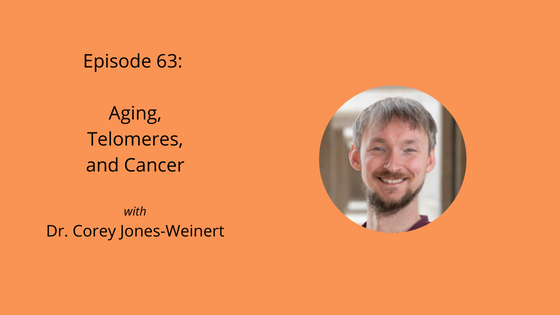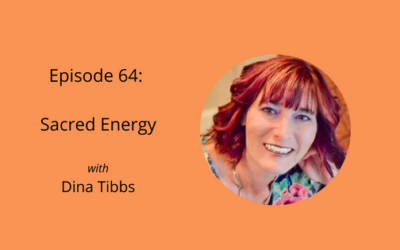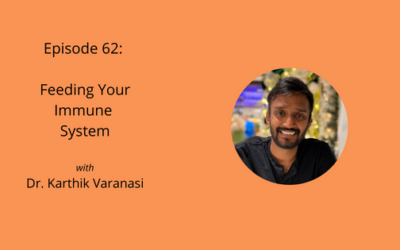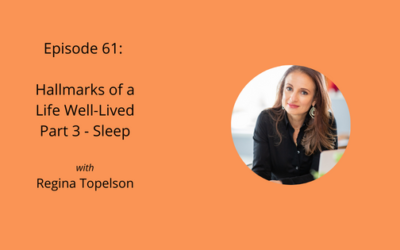The connection between aging, telomeres, and cancer isn’t always clear.
What are telomeres?
Telomeres are the endcaps of our chromosomes. Chromosomes are the entities that store our genes, which are made up of DNA. DNA is the genetic code that dictates everything about us – our hair color, eye color, how tall we are, etc … if we like tomatoes, milk, or okra, all the way down to which cells should divide when and how often. This is where the story begins…
If we think of chromosomes as long strands of genetic material, kind of like shoe laces, then telomeres are the plastic end caps of those shoe laces which keep them from fraying and unraveling (which would be a very bad thing in this example because you wouldn’t want your chromosomes breaking, fraying, or unraveling and therefore, exposing your DNA).
But as you age, your telomeres get shorter. This can be a signal for a cell to stop dividing and go into senescence (old age) or to die (programmed cell death also known as apoptosis). These are the best scenarios. It’s when the signal doesn’t work or when chromosomes come together is a way they shouldn’t (during replication) that mutations, overgrowth, or other problems that allow cancer to develop.
What is the connection between telomeres and aging?
All cells have a copy of the genetic information you carry. As your cells, divide and get recycled, that genetic information is copied so that the next cell can have that information too. This happens many times and each time the length of the telomere gets shorter. When the telomere gets too short it loses its function and it’s time for the cell to be recycled, meaning the cell enters senescence (old age) or it dies (apoptosis).
Telomere shortening does cause some of the aging process, but it also is a symptom of aging too.
“Telomere length is a clock of aging, (not the reason for aging). It can tell you, relative to yourself, how you’ve aged over the last ten years.”
Dr. Corey Jones-Weinert
The connection between telomere shortening and cancer.
Telomere shortening leads to a process called autophagy, literally eating oneself.
“The cell recycles parts of its own cell to try to conserve energy.” When a cell gets rid of too many parts it can’t function properly and dies.
Dr. Corey Jones-Weinert
This is a protective mechanism against cancer because it prevents short telomeres from fusing together and breaking in random places thereby introducing mutations. The accumulation of many random mutations is what can lead to cancer. But these random mutations are also what spurs the cell to try to lengthen telomeres. So, it’s definitely a delicate balance.
Both nature and nurture are important when it comes to telomere length.
Life stress from poverty, homelessness, war, sitting in traffic, a bad review at work, being chased by a lion or lack of exercise, cancer, etc… all impact the length of your telomeres. It also affects the telomeres of your children, and maybe even their children.
But also, if your grandparents had those stresses and passed on short telomeres to you, then that’s kind of the hand you were dealt. Both genetics and your current lifestyle play a part in the length or shortening of your telomeres.
And though some things are out of your control, it’s wise to pay attention to the way you live your life to counterbalance any genetic problems you may have inherited. This is a process called epigenetics, or the act of the environment exerting influence on your genes, turning them on or off, resulting in health issues (or not).
What you can do to preserve the length of your telomeres.
Supplements may be helpful, but they can also do damage you may not know about. Not all supplements are safe for cancer survivors. Before using supplements do your research, ask your doctor, and use caution because we don’t know everything about how supplements affect our telomeres… and how they affect cancer formation. Supplements can also be expensive and may not have the desired effects or any effects.
“The best thing you can do is be healthy overall.”
Dr. Corey Jones-Weinert
Drinking less, exercising more, not smoking, better sleep, and eating well are some of the most important and effective things you can do to preserve telomere length. Several studies have shown that a Mediterranean Diet has positive effects on telomere length. People in the Blue Zones live longer and have longer telomeres. Even still, though they may live longer and healthier, they still age. They could potentially increase their lives by 15-20 years, which is already a lot, but they still age.
“Caloric restriction and methionine restriction do prevent aging, but not telomere shortening.”
Dr. Corey Jones-Weinert
Here are some of my favorite moments from this episode:
- 2:15 What are telomeres?
- 6:32 Mutations and cancer development.
- 12:18 What happens when telomeres get too short.
- 14:00 Telomeres and aging.
- 21:11 The delicate balance of telomere length and cancer.
- 27:08 Which is more important, nature or nurture?
- 32:04 Reproductive ability, aging, supplements, and telomeres.
- 46:25 What to do to preserve telomere length.
- 49:36 Intermittent fasting, methionine restriction, and telomere protection.
- 52:02 A surprise ingredient’s effect on telomeres.
Links mentioned in this episode:
- Article on DNA damage response RNAs co-authored by Dr. Corey Jones-Weinert
- Telomere Length Analysis Test
- PubMed
Subscribe & Review in iTunes
Not subscribed to the podcast yet? Subscribe today so you don’t miss out on upcoming new content! Trust me, this is stuff you’re not gonna wanna miss! Don’t know how to review a podcast? Check out this article I wrote about rating and reviewing a podcast.
Want more?
If you’re stressed about what to eat check out episode 34 with Cathy Leman, RD, or episode 35 where I talk about food rules vs. food values. Episode 19 and episode 30 were about balancing components of an anti-cancer lifestyle. Episodes 25, 31, and 32 were about helping you find ways to heal your soul through Reiki and healing touch, writing, and art therapy. Funny episode 16 with Dr. Shari Fox.
Spread the love!
Share this blog, podcast, or email musings with your friends and family.









